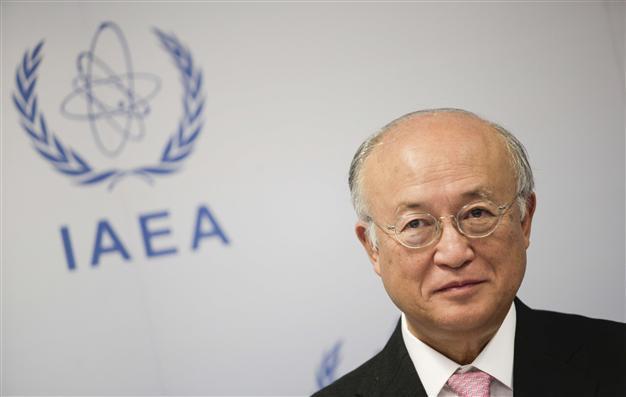IAEA says looks into Russian warning on Syria nuclear site
VIENNA - Reuters

Picture taken on July 1, 2013 showsd the Director General of the International Atomic Energy Agency (IAEA) Yukiya Amano addressing a press conference at the International Conference on Nuclear Security held at the UN atomic agency headquarters in Vienna. AFP photo
The U.N. nuclear watchdog has received a request from Russia to assess the impact if a missile were to hit a small Syrian reactor and is considering the issue, the Vienna-based agency said on Friday.Russia said this week a military strike on Syria could have catastrophic effects if the research reactor near Damascus that contains radioactive uranium was struck, "by design or by chance".
It called on the U.N. International Atomic Energy Agency (IAEA) to urgently assess the risk as the United States considers military action to punish Syria's government for an alleged gas attack.
"I can confirm that the IAEA has received a formal request from the Russian Federation. The agency is considering the questions raised," IAEA spokeswoman Gill Tudor said in an e-mail, giving no further detail.
Russia said nearby areas could be contaminated by highly enriched uranium and that it would be impossible to account for the nuclear material after such a strike, suggesting it could fall into the hands of people who might use it as a weapon.
Nuclear experts say the so-called Miniature Neutron Source Reactor (MNSR), a type of research reactor that is usually fuelled by highly enriched uranium, is small and that any radioactive fallout may pose a local hazard.
The amount that such a reactor usually holds, about 1 kg of highly enriched uranium, is less than the 25 kg that would be sufficient to build a bomb, they say.
One Western diplomat in the Austrian capital played down the issue. "It is very unlikely that something like this happens, and the quantity which is in this research reactor is very small," the envoy said. "I have the feeling that the agency does not perceive this as a very grave concern."
Moscow has been the most powerful ally of Syrian President Bashar al-Assad, shielding him from tougher U.N. resolutions and warning that any Western military attack on Syria would raise tension and undermine efforts to end the country's civil war.
In 2007, Israel bombed a desert site in Syria that U.S. intelligence reports said was a nascent, North Korean-designed reactor geared to producing plutonium for nuclear weapons. Syria said the site, at Deir al-Zor, was a conventional military facility.
















